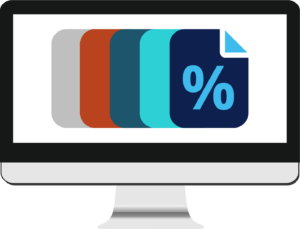E-Invoicing Ordinance and Growth Opportunities Act

Legal basis of the e-invoicing obligation
Since January 1, 2025, e-invoicing is mandatory for all companies in the B2B sector. This page summarizes the legal basic info for you.
What does the E-Invoicing Ordinance define?
European directives for e-invoice formats
Growth Opportunities Act obliges companies to e-invoicing
Which are the benefits of mandatory e-invoicing?
Which transitional periods apply to the exchange of e-invoices?
How do companies create the conditions for exchanging e-invoices?
What does the E-Invoicing Ordinance define?
In November 2020, the E-Invoicing Ordinance (E-Rechnungsverordnung) was adopted in Germany and Europe. This law obliges public institutions in the European Union to receive and process electronic invoices.
Unlike paper invoices, e-invoices are based on a standardized semantic data model. The e-invoicing regulation declares the XRechnung and ZUGFeRD invoice formats to be approved standards for electronic invoicing in Germany.
With the E-Invoicing Ordinance, e-invoicing has become mandatory throughout Germany in the exchange of invoices with public clients. According to the Growth Opportunities Act (Wachstumschancengesetz), this method has also been mandatory in the B2B sector since January 1, 2025.
European directives for e-invoice formats
The EU Directive 2014/55/EU was developed by the European Committee for Standardization (CEN: Comité Européeen de Normalisation) and obliges all contracting authorities in Europe to receive and process e-invoices.
The standard for electronic invoicing EN 16931 is based on this directive and defines the use of the XML data format for e-invoices throughout Europe. Each EU member state can develop its own specification based on this standard.
In Germany, the two invoice formats XRechnung and ZUGFeRD (Zentraler User Guide des Forums elektronische Rechnung Deutschland) have been defined as the standard. France and Germany jointly developed the Factur-X format, which is identical to the ZUGFeRD format.
Growth Opportunities Act obliges companies to e-invoicing
On March 22, 2024, the Federal Council in Germany approved the Growth Opportunities Act (Wachstumschancengesetz). This means that from January 1, 2025, all invoices between companies will be exchanged in the form of e-invoices.
As this obligation poses a huge challenge for companies, transitional periods (in accordance with Section 27 (39) UStG-E) are planned for the period from 2025 to 2027.
Despite these transitional periods, we recommend that companies transform their financial processes today. On the one hand, they will be immediately prepared for receiving e-invoices, which will be mandatory by the deadline. On the other hand, they will benefit in the long term from legal compliance and increased efficiency thanks to the fully digital and automated invoicing process.
Which transitional periods apply to the exchange of e-invoices?
The complete digitization of the invoicing process is a huge challenge for many companies. For this reason, the legislator has set the following transitional periods for sending and receiving e-invoices.
Until January 1, 2027, companies may still send other invoices (paper invoices, PDF, JPG), but only if the recipient allows them to do so. From this date, companies with an annual turnover of more than 800,000 euros must only send e-invoices. Smaller companies will still benefit from simplified conditions in 2027, but these are also dependent on the consent of the invoice recipient.
January 1, 2028 is then the deadline from which every company must send and receive e-invoices.
Which are the benefits of mandatory e-invoicing?
The e-invoicing obligation in Germany is increasingly ensuring the standardization of invoice formats and improving the security of invoicing processes. Companies can automatically issue legally compliant invoices and benefit from the more efficient processes that come with digitization.
With the e-invoicing obligation, paper invoices and the effort involved in processing and archiving are increasingly disappearing. A fully data-based invoicing process minimizes the effort involved in issuing and receiving invoices. E-invoices are not only faster to create, send, remind and save, but they can also be received more quickly and processed seamlessly and without errors.
Standardized e-invoice formats also support the internationalization of companies. The prompt digitization of processes ensures hassle-free participation in EU-wide and international trade.
How do companies create the conditions for exchanging e-invoices?
In order to comply with the e-invoice obligation, you as a company must create the preconditions under your own responsibility. As a first step, companies need a valid VAT identification number and as unique electronic address (in accordance with the EAS). These details clearly identify the sender and recipient.
In the second step, you need suitable software to:
- Receive and process e-invoices
- Generate and send e-invoices
- Archive incoming and outgoing invoices
Our product JustOn Billing & Invoice Management offers you these functions from January 2025 and ensures compliance with applicable laws and tax regulations.



